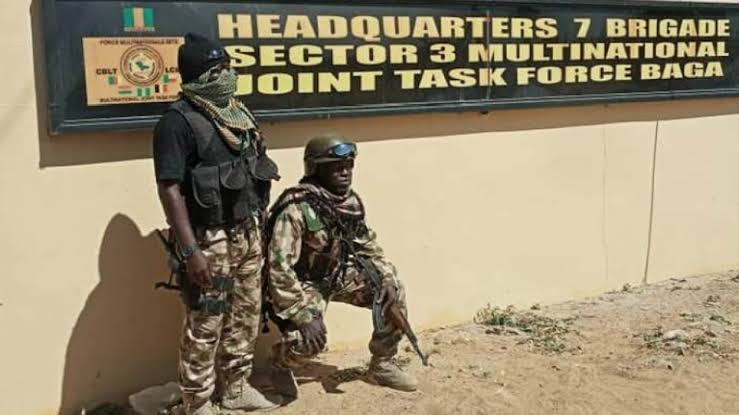Baga: Military, Borno Govt, Boko Haram Battle For Control

An ambush coordinated by Islamist insurgents on Friday against security forces escorting Borno state officials en route Baga has further reinforced the town’s recent history of instability and violence.
The town of Baga on the shores of Lake Chad used to be known as a lucrative trading hub for grains, smoked and dried fish but is now a ghost town.
An estimated population of 300,000 were believed to have lived in the area, including migrants attracted by the economic potentials and displaced by drought in other parts of the far north.
HumAngle has learned that eight policemen, six soldiers and four officials of the Civilian Joint Task Force were killed in the Friday attack. The state Governor Babagana Zulum was not in the convoy when the ambush took place as he had travelled by helicopter to Baga.
The officials were visiting the town located in Kukawa local government area of the state to participate in activities to mark the return of displaced persons.
In the past few weeks, the Borno state government reconstructed and rehabilitated public buildings, residential houses, schools, healthcare facilities, markets and water facilities in anticipation of the relocation of displaced persons back to their ancestral home on September 26.
During the constitution of the multiagency committee in charge of facilitating the return, Governor Zulum emphasised the need for displaced persons to return to the town and reengage in livelihood activities of fishing, farming and trading.
The return is expected to improve resilience and ease difficulties associated with living in camps.
The convoy encountered the ambush at Korochara, between Monguno and Baga, about 2 kilometres from the military base in the town.
On July 29, the convoy of Zulum was also involved in an attack scare near Baga. In a video of the incidents widely shared online, his close protection details could be seen extracting their principal and moving him into a police Mine-Resistant Ambush Protected vehicle.
In the aftermath of the attack, the governor expressed his displeasure with the incident and general security situation in Baga.
“You people said there is no Boko Haram here, then who attacked us? You have been here for over one year now, there are 1,181 soldiers here, if you cannot take over Baga which is less than 5km from your base, then we should forget about Baga,” Zulum said.
The proximity of Baga and its environs in Kukawa local government area to Lake Chad islands and wetlands has made the area a hotspot for clashes between insurgents and the military.
On the evening of April 16, Boko Haram attacked a military patrol in Baga, killing a soldier and wounding five others. Military reinforcements were reported to have engaged in running gun battles through the town, leaving behind a trail of destruction.
According to Human Rights Watch, satellite images of the town revealed extensive destruction affecting an estimated 2,275 buildings.
In January 2015, hundreds of people were killed and many more displaced when Boko Haram overran the military base in Baga, destroyed houses and abducted civilians.
On February 21, 2015, the Nigerian military announced the recapture of Baga and surrounding communities.
Since then, insurgents have repeatedly attacked civilians and military positions in the area.
In December 2018, Maiduguri and Jere local government areas recorded an influx of displaced persons from Baga after intense clashes and hostilities in the area.
Islamic State West Africa Province (ISWAP) insurgents overran the nearby 7 Brigade Multinational Joint Task Force (MNJTF) base after a fierce battle and destroyed a naval base in Mile 3, which lies 3 miles from Baga.
A few weeks later, in January 2019, Nigerian troops recaptured the base after advancing into Baga from their staging ground located in the strategic garrison town of Monguno.
In July of the same year, MNJTF and Nigerian troops thwarted a surprise coordinated dawn attack on their position.
The threat in the area continues and sustained low-intensity battles have discouraged the return and resettling of civilians, despite the economic importance of the town and claims by the military that it had regained control.
A HumAngle report in April had highlighted the significant role of aquatic resources as sources of livelihood and in sustaining the insurgency.
Support Our Journalism
There are millions of ordinary people affected by conflict in Africa whose stories are missing in the mainstream media. HumAngle is determined to tell those challenging and under-reported stories, hoping that the people impacted by these conflicts will find the safety and security they deserve.
To ensure that we continue to provide public service coverage, we have a small favour to ask you. We want you to be part of our journalistic endeavour by contributing a token to us.
Your donation will further promote a robust, free, and independent media.
Donate HereStay Closer To The Stories That Matter





The military needs to tap the intellectual resources of the Nigerian Intelligentsia (academics, journalists, politicians and so on) so as to evolve new strategies for tackling the insurgency. Otherwise, we are in for a long haul.